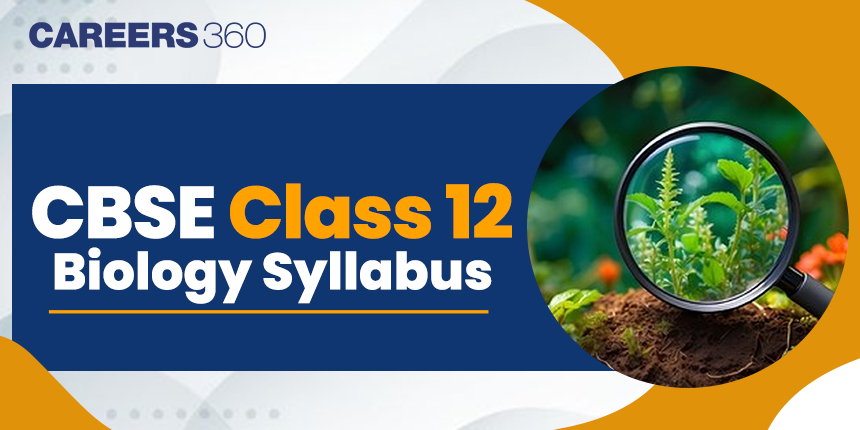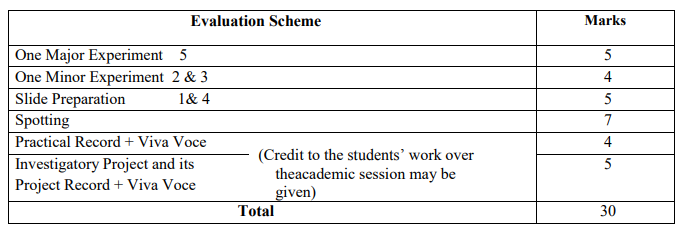CBSE Class 12 Biology Syllabus 2025-26 (Released PDF) – Download Latest Curriculum & Marking Scheme
The Central Board of Secondary Education has released the latest CBSE Biology Class 12 syllabus 2025-26. Students can download the latest CBSE Class 12 Biology syllabus PDF 2025-26 using the link provided below or they can visit the official website at cbseacademic.nic.in. This year, the board has not reduced the CBSE 12th syllabus 2025-26. The CBSE 12th exam is expected to be held from February 17 to April 4, 2026. Students are advised to complete the syllabus at least a month before the exam to save enough time for revisions and practice.
Download: CBSE Biology Class 12 Syllabus 2025-26 PDF
Students appearing for the CBSE board exams should come in their proper school uniform as per the guidelines. Private candidates, however, are required to wear plain, light-coloured formal attire while reporting to the examination centre.
This Story also Contains
- CBSE 12th Syllabus 2025-26
- CBSE Biology Class 12 Syllabus 2025-26
- Important Topics of CBSE Class 12th Biology Syllabus 2025-26
- CBSE Class 12 Biology Syllabus 2025-26 for Practical
- Prescribed Books for CBSE Class 12 Bio Syllabus 2025-26
- CBSE Class 12 Biology Preparation Tips 2025-26

The 2025-26 biology syllabus Class 12 CBSE consists of all the units, chapters, and topics for the theory exam, along with the details of the practicals. Students can check the mark allotted for each unit in the CBSE Class 12 Biology Syllabus 2025-26. There are a total of 5 units in the CBSE biology syllabus for class 12th. We have provided detailed information below in this article. Students can refer to it while preparing for the CBSE 12th exams.
Students can also check all the important and high-weightage topics from the syllabus of biology class 12 and prepare accordingly for the CBSE Board exams 2025-26. The CBSE Class 12 Biology Syllabus 2025-26 is also useful while preparing for the competitive exams. Read the complete article to know the detailed CBSE Class 12 syllabus 2025-26 for biology, marking scheme, steps to download PDF, preparation tips and more.
CBSE 12th Syllabus 2025-26
The CBSE Class 12 syllabus 2025-26 is very important for students; they should try to understand the syllabus in depth. It will help them make strategies to ace their exams.
- CBSE Class 12 Maths Syllabus 2025-26
- CBSE Class 12 Physics Syllabus 2025-26
- CBSE Class 12 Chemistry Syllabus 2025-26
CBSE Biology Class 12 Syllabus 2025-26
There are no changes in the CBSE Biology syllabus class 12th. There are a total of 5 units in the syllabus of Biology. The theory papers consist of 70 marks, and the practical exams will be of 30 marks.
| Units | Topics | Marks |
|---|---|---|
| Unit 6 | Reproduction | 16 |
| Unit 7 | Genetics and Evolution | 20 |
| Unit 8 | Biology and Human Welfare | 12 |
| Unit 9 | Biotechnology and Its Applications | 12 |
| Unit 10 | Ecology and Environment | 10 |
| Total | 70 |
Important Topics of CBSE Class 12th Biology Syllabus 2025-26
The chapters incorporated in each unit are given in the table below for the convenience of students. For a detailed CBSE class 12 bio syllabus, students can download the PDF file using the link given above.
| Unit No | Chapter No | Particulars |
|---|---|---|
| Unit-VI Reproduction | Chapter 2: Sexual Reproduction in Flowering Plants | Flower structure; development of male and female gametophytes; pollination - types, agencies and examples; outbreeding devices; pollen-pistil interaction; double fertilisation; post-fertilisation events - development of endosperm and embryo, development of seed and formation of fruit; special modes- apomixis, parthenocarpy, polyembryony; Significance of seed dispersal and fruit formation. |
| Chapter 3: Human Reproduction | Male and female reproductive systems; microscopic anatomy of testis and ovary; gametogenesis -spermatogenesis and oogenesis; menstrual cycle; fertilisation, embryo development up to blastocyst formation, implantation; pregnancy and placenta formation (elementary idea); parturition (elementary idea); lactation (elementary idea). | |
| Chapter 4: Reproductive Health | Need for reproductive health and prevention of Sexually Transmitted Diseases (STDs); birth control - need and methods, contraception and medical termination of pregnancy (MTP); amniocentesis; infertility and assisted reproductive technologies - IVF, ZIFT, GIFT (elementary idea for general awareness). | |
| Unit-VII Genetics and Evolution | Chapter 5: Principles of Inheritance and Variation | Heredity and variation: Mendelian inheritance; deviations from Mendelism – incomplete dominance, co-dominance, multiple alleles and inheritance of blood groups, pleiotropy; elementary idea of polygenic inheritance; chromosome theory of inheritance; chromosomes and genes; Sex determination - in humans, birds and honey bee; linkage and crossing over; sex linked inheritance - haemophilia, colour blindness; Mendelian disorders in humans - thalassemia; chromosomal disorders in humans; Down's syndrome, Turner's and Klinefelter's syndromes. |
| Chapter 6: Molecular Basis of Inheritance | Search for genetic material and DNA as genetic material; Structure of DNA and RNA; DNA packaging; DNA replication; Central Dogma; transcription, genetic code, translation; gene expression and regulation - lac operon; Genome, Human and rice genome projects; DNA fingerprinting. | |
| Chapter-7: Evolution | Origin of life; biological evolution and evidences for biological evolution (paleontology, comparative anatomy, embryology and molecular evidence); Darwin's contribution, modern synthetic theory of evolution; mechanism of evolution - variation (mutation and recombination) and natural selection with examples, types of natural selection; Gene flow and genetic drift; Hardy - Weinberg's principle; adaptive radiation; human evolution. | |
| Unit-VIII Biology and Human Welfare | Chapter 8: Human Health and Diseases | Pathogens; parasites causing human diseases (malaria, dengue, chikungunya, filariasis, ascariasis, typhoid, pneumonia, common cold, amoebiasis, ring worm) and their control; Basic concepts of immunology - vaccines; cancer, HIV and AIDS; Adolescence - drug and alcohol abuse. |
| Chapter 10: Microbes in Human Welfare | Microbes in food processing, industrial production, sewage treatment, energy generation and microbes as bio-control agents and bio-fertilisers. Antibiotics: production and judicious use. | |
| Unit-IX Biotechnology and its Applications | Chapter-11: Biotechnology - Principles and Processes | Genetic Engineering (Recombinant DNA Technology). |
| Chapter 12: Biotechnology and its Applications | Application of biotechnology in health and agriculture: Human insulin and vaccine production, stem cell technology, gene therapy; genetically modified organisms - Bt crops; transgenic animals; biosafety issues, biopiracy and patents. | |
| Unit-X Ecology and Environment | Chapter 13: Organisms and Populations | Population interactions - mutualism, competition, predation, parasitism; population attributes - growth, birth rate and death rate, age distribution. (Topics excluded: Organism and its Environment, Major Abiotic Factors, Responses to Abiotic Factors, Adaptations) |
| Chapter-14: Ecosystem | Ecosystems: Patterns, components; productivity and decomposition; energy flow; pyramids of number, biomass, energy (Topics excluded: Ecological Succession and Nutrient Cycles) | |
| Chapter 15: Biodiversity and its Conservation | Biodiversity- concept, patterns, importance; loss of biodiversity; biodiversity conservation; hotspots, endangered organisms, extinction, Red Data Book, Sacred Groves, biosphere reserves, national parks, wildlife, sanctuaries and Ramsar sites. |
CBSE Class 12 Biology Syllabus 2025-26 for Practical

How to Download CBSE Class 12 Biology Syllabus PDF 2025-26?
Follow the steps given below to download the CBSE 12th syllabus for Biology 2025-26 from the official website:
- Go to the official website, cbseacademic.nic.in.
- On the home page, click on the ‘Curriculum’ option.
- Click on the ‘Senior Secondary Curriculum (XI-XII)’.
- Select Academic Electives - (Group-A).
- Now click on the Biology tab. The Biology syllabus class 12 CBSE 2025-26 will be displayed on your screens. Save the syllabus in PDF format.
Prescribed Books for CBSE Class 12 Bio Syllabus 2025-26
CBSE prescribed NCERT Books for Class 12 Biology to complete the CBSE Class 12 Biology Syllabus 2025-26. It is important to refer to the NCERT book as it covers the entire syllabus in a simple and easily understandable language. Relevant diagrams are also provided with each topic for better understanding. Below is the list of prescribed books by CBSE:
- Biology, Class-XII, Published by NCERT
- Other related books and manuals brought out by NCERT (including multimedia)
- Biology Supplementary Material (Revised). available on CBSE website.
CBSE Class 12 Biology Preparation Tips 2025-26
While preparing for the CBSE Class 12th, students must implement some simple but effective tips and tricks to score well in the same. Biology is a subject that will help you score very well if you take it seriously and give your best. Go through some of the best preparation tips for CBSE 12th Biology:
- Complete the CBSE Class 12 Biology syllabus 2025-26 as soon as possible so that you can give maximum time for revision.
- Students must refer to the CBSE class 12 time table and plan their studies accordingly.
- Do not mug up the theories of Biology, instead, try to understand the meaning of the same and make personal notes. These notes will help you to revise at the last moment.
- After completing the CBSE Class 12 Biology Syllabus 2025-26, students must solve the CBSE Class 12 question papers. This will help them to know the exam pattern, marking scheme and important topics.
- Dedicate maximum time for the revision and do not ignore any doubts. Clear them right away. Seek help from others in case of confusion. Also, do not stress about the board, instead, give your best and score well in CBSE Class 12 result .
Also, Read:
Frequently Asked Questions (FAQs)
Yes, NCERT books are enough to prepare for the exams and cover the CBSE class 12 Biology syllabus 2025-26.
The CBSE 12th exam dates and CBSE 10th time table are released by CBSE through its official website, cbse.gov.in.
Students must score at least 33 per cent marks per subject in order to pass the CBSE Class 12 exams.
Students can access topic-wise solutions using the links available on this page.
Questions related to CBSE Class 12th
On Question asked by student community
Hello
You will be able to download the CBSE Previous Year Board Question Papers from our official website, careers360, by using the link given below.
https://school.careers360.com/boards/cbse/cbse-previous-year-question-papers
I hope this information helps you.
Thank you.
Hello
You will be able to download the CBSE Pre-Board Class 12 Question Paper 2025-26 from our official website by using the link which is given below.
https://school.careers360.com/boards/cbse/cbse-pre-board-class-12-question-paper-2025-26
I hope this information helps you.
Thank you.
Hello,
Yes, it's completely fine to skip this year's 12th board exams and give them next year as a reporter or private candidate, allowing you to prepare better; the process involves contacting your current school or board to register as a private candidate or for improvement exams during the specified
HELLO,
Yes i am giving you the link below through which you will be able to download the Class 12th Maths Book PDF
Here is the link :- https://school.careers360.com/ncert/ncert-book-for-class-12-maths
Hope this will help you!
Hello,
Here is your Final Date Sheet Class 12 CBSE Board 2026 . I am providing you the link. Kindly open and check it out.
https://school.careers360.com/boards/cbse/cbse-class-12-date-sheet-2026
I hope it will help you. For any further query please let me know.
Thank you.
Applications for Admissions are open.
As per latest syllabus. Physics formulas, equations, & laws of class 11 & 12th chapters
JEE Main Important Chemistry formulas
Get nowAs per latest syllabus. Chemistry formulas, equations, & laws of class 11 & 12th chapters
JEE Main high scoring chapters and topics
Get nowAs per latest 2024 syllabus. Study 40% syllabus and score upto 100% marks in JEE
JEE Main Important Mathematics Formulas
Get nowAs per latest syllabus. Maths formulas, equations, & theorems of class 11 & 12th chapters
